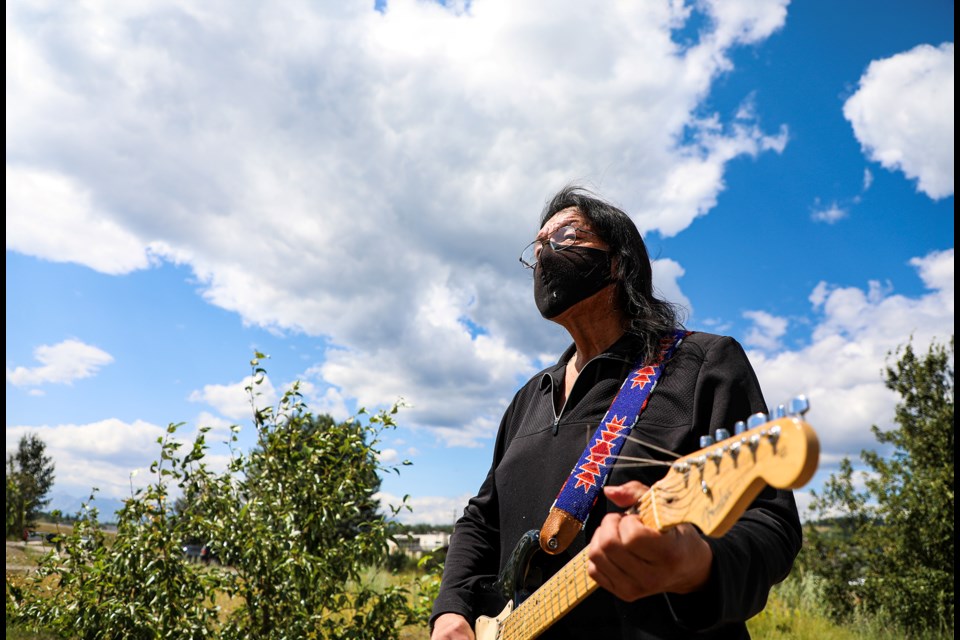ÎYÂRHE NAKODA – Take Marlon House back to eight years old.
Tickled by the swamp rock Creedence Clearwater Revival rolled.
A groove that led him to find his own sound, playing country rock, crooning to a hometown crowd.
As a young boy, House remembers fondly the first time he heard the distinctive guitar riff and raw, raspy vocals of John Fogerty that kicked off Creedence Clearwater Revival’s Green River. His late mother, Margaret House, had just gifted him the album.
“I liked it,” he said, in his soft-spoken way.
House liked it so much that hearing it kickstarted his own storied music career, where he says at its height, he was competing alongside seminal Canadian music figure Ian Tyson for Alberta Recording Industries Association accolades.
“That was in the 90s,” he said. “I didn’t win anything when I was nominated, but it was a nice surprise and it helped keep me going.”
House is from Îyârhe (Stoney) Nakoda First Nation and hangs his hat in Mînî Thnî – a place where he’s also recorded much of his music under the self-titled moniker, Marlon House Band, in his home studio.
But before he was Marlon House Band, he was part of Exile – a gritty, garage rock band he played in in high school.
“At that time, I had to get permission to play in bars,” he said.
Since the beginning, House has been strumming guitar and leading vocals. It was a venture he picked up from his guitar-playing late father, Roy Hunter.
These days, though, he does it all.
“When I’m playing on stage, I sing and play my guitar. When I’m recording, I play all the instruments. I play the bass, I play the drums, I sing the backup vocals and I play the keyboard, and I put ‘em all together.”
After House inevitably left his first project in search of a new sound, he didn’t instantly become a solo act. In fact, Marlon House Band started as a two-man ensemble.
“My brother Leslie House and myself started our own band in the community. We played music you could two-step to. He played the fiddle and we could really get people going.”
A few humble basement gigs later, the brothers’ sound caught wind and word spread to Eden Valley of the up-and-comers.
But they still needed a drummer and a bass player.
“We put up some ads, but we couldn’t find anybody, so we taught my dad how to play the bass, and my other brother, Roy, we taught him how to play the drums,” said House.
“Suddenly, we had a band and we started playing everywhere.”
House and his band performed across Alberta at music festivals, Calgary Stampede, casinos, weddings, and for Christmas, Halloween, New Year’s Eve and birthday dances.
At one point, the band played at the Jack Singer Concert Hall in Calgary.
“That was in 2000, but it was a big deal, and definitely one of the biggest shows I have ever played,” he said.
Before long, though, the band started to fall apart. They were down a drummer, then his brother Leslie passed away, and later, his father also died.
“It was rough and I didn’t really want to play music for a while. My mother had also passed away and for a while, it was difficult to do much of anything,” said House.
“I didn’t even want to leave my home.”
But House crawled his way out of the emotional wreckage. For much of his music career, he has made a go of it on his own.
“I still love what I do. I make the best of it and have kept the sound of the band alive,” he said.
The country rock crooner still plays gigs around the province, many of them in his hometown. The Îyârhe Nakoda community has come to know and love band classics like Nakoda Country, Tammy and Without You.
Nakoda Girl, a song House wrote about a good friend, is also the title of his 2008 album. At popular demand, House recently released another batch of the album for sale at the Chiniki Gas Bar.
Other albums, including Country Rock and his latest, Mînî Thnî Music, can be purchased through House directly by reaching out to him at [email protected].
House is also working on another record, which he expects to release in October.
“I’m always making music. As long as it still brings me joy and keeps people dancing, I will keep going,” he said.
The Local Journalism Initiative is funded by the Government of Canada. The position covers Îyârhe (Stoney) Nakoda First Nation and Kananaskis Country.




